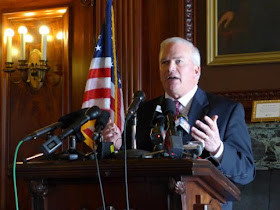A measure of business conditions in the Chicago region contracted for the third time in four months, reflecting ongoing struggles by American manufacturers as well as the two-week-old General Motors workers strike.Even closer to home, southeast Wisconsin is falling even further behind in the manufacturing.
The Chicago PMI business barometer dropped to 47.1 in September from 50.4 in the prior month, MNI Indicators said Monday. Any reading below 50 indicates worsening conditions…..
The barometer averaged 47.3 in the third quarter, the lowest level since the U.S. exited recession in the middle of 2009.
What happened: Production in the Chicago region sank to a 10-year low, but the decline was exaggerated by the strike at GM.
Even if the strike is set aside, however, the report showed broad weakness. The backlog of orders and inventories also fell sharply.
The Milwaukee-area manufacturing sector contracted for a third straight month in September, according to the latest Marquette-ISM Report on Manufacturing.This is reflected in Wisconsin losing jobs in the sector for 2019, despite having the WisGOP Legislature retain a tax cut for manufacturing businesses that is projected to cost $307.5 million in this fiscal year.
The report’s Milwaukee-area PMI registered 45.41 in September, down from 47.29 in August. Any reading below 50 suggests the industry is contracting. The index was also below 50 in July and May. It is the first time the sector has seen a prolonged negative streak since a nine-month stretch in 2015.
The index has been below 50 in four of the last five months and its six-month average has now dipped below that threshold….
Production, employment, customer inventories, backlog and imports all dropped and were in negative territory in September.
Blue-collar employment in particular saw a sharp fall, from 57 in August to 45.2 in September. Some respondents said companies are exploring a temporary layoff of blue-collar workers while others noted company owners were keeping staffing steady to retain an effective team.
These bad reports might help to explain why the Philadelphia Federal Reserve bank has Wisconsin as the Midwest’s answer to “one of these things is not like the other” for state economies in August 2019.
At both the state and federal levels, the major tax breaks given to these businesses are not translating into the large-scale job and wage growth that GOPs claimed it would. Maybe it’s time we stop giving away the farm to these corporations, and instead empower workers in those businesses.
This can be done not only through encouraging workers to have more representation when it comes to business operations (worker boards and/or unions having a role in state policy comes to mind), but also by expanding the safety net so corporations cannot use benefits as a cudgel to discourage wage demands and job security (like in the GM strike).
So far, the slowdown in the Midwestern industrial economy hasn’t crossed over into a full-scale recession for the rest of the country. But it’s also not what Donald Trump promised blue-collar those “real Americans” when the manufacturing economy last stagnated in 2015 and 2016. And what would develop over the next year to stop the bleeding for those industries, as prices for goods keep falling and wages continue to stagnate?
Good luck running on the economy in these parts in 2020, GOPs.

























